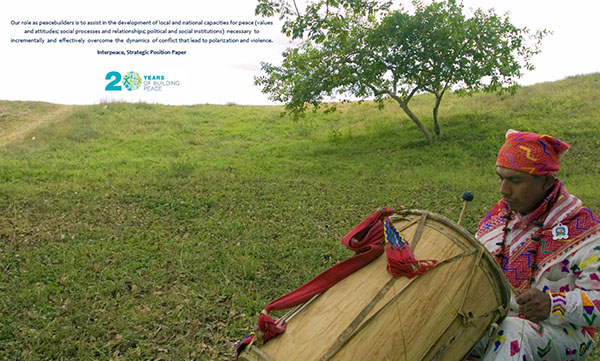Second edition of the anniversary journal has been released

The second edition of Interpeace’s Anniversary Journal has been released. The first edition proved a great success and now the second issue is poised to be even more informative with interesting perspectives. The journal was published by our Regional Office in Central America to celebrate Interpeace’s 20th anniversary. The second edition in its entirety is available ici
The relationship between the armed forces and the people
In the opening article of the journal, Francisco Jiménez Irungaray examines the role of the army in Guatemala, and Central America in general, and its relationship with the people. Irungaray brings to attention the powerful position which the army holds in Guatemalan politics. Furthermore, he highlights how Interpeace is encouraging the resolution of conflicts when they become violent. The establishment of dialogue spaces for civil society and armed forces is one process supported by Interpeace to improve relations between the people and the army in Guatemala.
Read the full article by Francisco Jiménez Irungaray.
Towards a more holistic approach to security: A conversation with Adam Blackwell
The Multidimensional Security Secretariat (MSS) was set up by the Organizations of American States (OAS) to prevent, confront and respond to security threats in the Central America region. The man tasked with leading this organization, Secretary Adam Blackwell, addresses new security threats with a more holistic approach. His strategy takes into consideration social, economic and political aspects of conflict. Rather than only addressing the symptoms of poverty and marginalization with military force, Blackwell explains that politicians and civil authorities must emphasize victim assistance, crime prevention and rehabilitation of perpetrators, putting the individual at the center of the security agenda.
Read the full interview with Adam Blackwell.
Realizing the potential of youth
Director-General of Interpeace, Scott M. Weber, analyzes the efforts that have been undertaken to reduce youth violence in Central America. Not only confined to developing regions, Weber highlights how youth unrest has been a global phenomenon. Looking at the faults of the traditional “mano dura” or “iron fist” policies in Central America, he points out the need to identify the root causes of youth violence like high unemployment and the breakdown of welfare services. Moreover, he stresses the need to unlock the potential of youth as positive change agents in their societies.
Read the full article by Scott M. Weber.
Take a closer look and get details of the full report.
